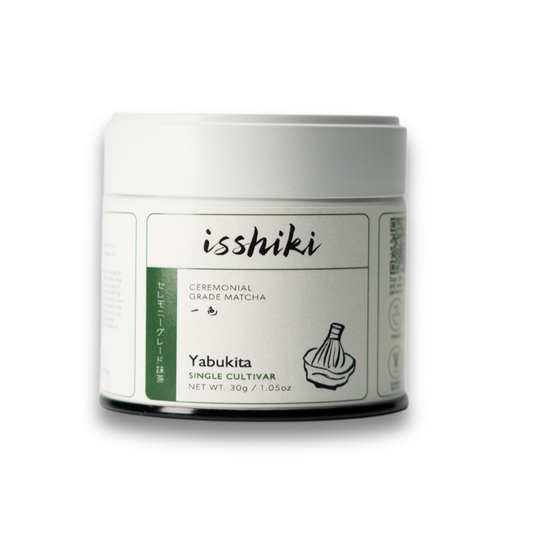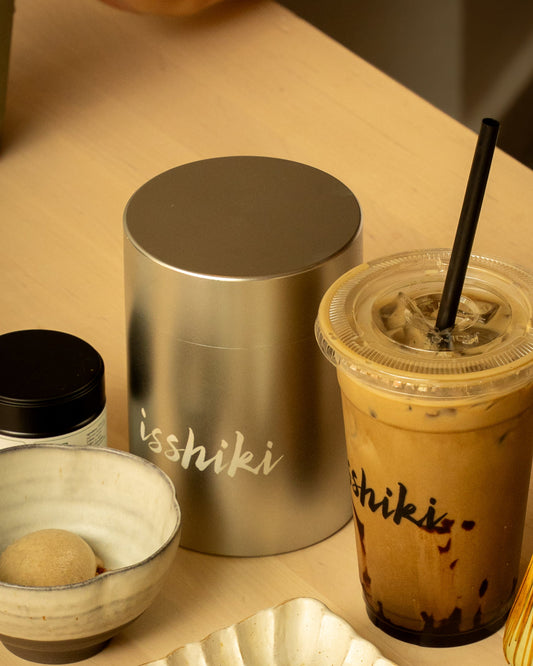So you’re getting into matcha, huh? Welcome to the green team! But hold up—before you scoop that bright green powder into your latte, let’s figure out what you’ve actually got on your hands. You’ve probably seen all the buzzwords: ceremonial grade matcha, matcha powder ceremonial grade, best ceremonial grade matcha, and more. But what do they really mean? And how the heck is culinary grade any different?
If you’ve been wondering what is ceremonial grade matcha, or you’ve typed “ceremonial grade matcha near me” into Google more times than you can count, this guide is your new best friend. Let’s break it all down—from color and taste to quality, price, and why some matcha is best for sipping while others belong in your cookies.
What Is Matcha Anyway?
Matcha is basically finely ground powder made from specially grown green tea leaves. But not just any green tea leaves—these babies are shade-grown, hand-picked, and then stone-ground to perfection. What makes it different from your regular cup of green tea? You’re actually consuming the whole leaf. That means you’re getting all the antioxidants, caffeine, and that lovely calming amino acid called L-theanine in one vibrant green sip.
This ain’t your average tea bag.

Ceremonial Grade Matcha: The Real Deal
Ceremonial matcha is the elite, the VIP, the high-end stuff. It’s made using only the youngest, most tender tea leaves, and it’s traditionally used in Japanese tea ceremonies. Hence the name—ceremonial grade matcha.
What Does Ceremonial Grade Matcha Mean?
When you see a label like matcha ceremonial grade, it means the powder is meant to be whisked with water and enjoyed on its own—no milk, no sugar, no nonsense. It's all about the pure matcha experience.
Expect a vibrant green color, a silky smooth texture, and a naturally sweet, umami-packed flavor. This is not bitter or chalky. If it is, it ain’t the real deal. The best ceremonial grade matcha will give you a calming buzz and a little mental clarity. No crash. No jitters.
Why Color, Texture, and Taste Matter
Want to know if you’re sipping the good stuff? Here’s what to look for:
-
Color: Bright, almost neon green. Dull or yellowish? Pass.
-
Texture: Like baby powder—super fine.
-
Taste: Naturally sweet, smooth, zero bitterness.
If you're trying to level up your matcha game, this is where to start. Go for organic ceremonial grade matcha whenever possible—it’s purer and just tastes better.
Culinary Grade Matcha: What’s It For?
Alright, now let's talk about the more budget-friendly cousin: culinary matcha. This stuff is still matcha, but it’s made from older tea leaves that have a stronger flavor and a bit more bitterness. It’s not meant to be sipped solo—think matcha muffins, matcha pancakes, or those trendy matcha lattes you see on Instagram.
Best Uses for Culinary Matcha
Culinary matcha is ideal for:
-
Smoothies
-
Baking
-
Lattes (especially with milk)
-
Desserts like matcha ice cream or cookies
It’s got a bolder flavor that can hold its own in recipes and doesn’t get lost in milk or sugar.
Does It Taste Different?
You bet. Culinary matcha has a more robust, slightly bitter profile. That’s why it works great in baked goods where sugar balances it out. But drink it straight like ceremonial matcha? Yeah, you're not gonna love that.
Ceremonial vs Culinary Matcha: The Key Differences
Let’s make it real simple with a side-by-side breakdown:
|
Feature |
Ceremonial Grade Matcha |
Culinary Grade Matcha |
|
Color |
Bright, vibrant green |
Dull, olive or yellow-green |
|
Flavor |
Smooth, sweet, umami |
Bold, bitter, earthy |
|
Texture |
Ultra-fine, silky |
Slightly coarser |
|
Use |
Whisked with water |
Baking, smoothies, lattes |
|
Price |
$$$ |
$ |
|
Quality |
Highest |
Good, but not premium |
When people ask what is ceremonial grade matcha or what does ceremonial grade matcha mean, this table says it all.
Let’s Talk Quality: What Makes the Best Ceremonial Grade Matcha
High-quality matcha isn’t just about a fancy label. Look for:
-
Source: Grown in Japan, especially Uji or Nishio regions
-
Shade-grown: Enhances flavor and boosts chlorophyll
-
First harvest: Best leaves, picked in early spring
-
Stone-ground: Retains nutrients and flavor
-
Organic: No pesticides or synthetic fertilizers
That’s what makes organic ceremonial grade matcha so special—and why it’s worth paying more for the best ceremonial grade matcha.

Where Does It Come From? Region Matters!
Japan is the heart of matcha production. And not just anywhere in Japan—places like Uji, Kyoto, and Nishio are known for producing top-tier matcha powder ceremonial grade.
Why does region matter? Soil, climate, and centuries of tea-growing tradition. When you see products like encha ceremonial grade organic matcha or matchabar ceremonial grade matcha, you’ll often notice they mention their sourcing. That’s a big green flag (pun intended).
Why You Should Choose Organic Ceremonial Grade Matcha
Listen, you’re drinking the whole leaf here. If your matcha isn’t organic, you could be sipping on chemicals and pesticides—and no one wants that.
Organic ceremonial grade matcha is not just better for your body, it’s better for the planet. Look for USDA Organic or JAS certification to be sure you’re getting the real deal.
Encha Ceremonial Grade Matcha Powder Reviews: Is It Worth It?
Let’s talk Encha. If you’ve spent more than five minutes Googling matcha ceremonial grade, chances are you’ve seen the name Encha ceremonial grade matcha powder pop up more than once. And for good reason—this brand has built a reputation for offering high-quality, organic ceremonial grade matcha that doesn’t break the bank.
But what do real users say?
Flavor and Texture
Encha’s ceremonial matcha is super smooth. Like, velvet-in-your-mouth smooth. The taste? Naturally sweet, rich umami flavor with zero bitterness. That’s exactly what you want from a true ceremonial grade.
Sourcing and Quality
Here’s the kicker—Encha only uses first harvest leaves from organic farms in Uji, Japan. That’s top-tier sourcing. And it’s stone-ground, not machine-powdered, which helps preserve all those nutrients and antioxidants.
User Reviews and Ratings
Across platforms, encha ceremonial grade matcha powder reviews are glowing. People rave about its vibrant green color, clean taste, and how it makes them feel. Energetic, focused, and calm—all without the crash you get from coffee.
A few comments from users:
-
“The best ceremonial grade matcha I’ve ever tried.”
-
“Perfect for morning rituals—smooth and flavorful.”
-
“Organic and delicious. I’ll never go back to Starbucks matcha.”
Is Encha the best ceremonial grade matcha? Many say yes—and at its price point, it’s definitely one of the top contenders.
MatchaBar Ceremonial Grade Matcha Powder: The Hype vs Reality
MatchaBar is all over social media. From Instagram stories to wellness TikToks, matchabar ceremonial grade matcha powder is having a moment. But does it live up to the hype?
Packaging and First Impressions
Visually, MatchaBar nails it. Their branding is on-point, minimalist, and cool. The packaging protects the matcha from light and air (important for freshness). But hey, good looks only get you so far.
Taste Test
In terms of flavor, MatchaBar delivers. Their ceremonial grade matcha is slightly sweeter than others and super frothy when whisked right. It's got that creamy texture that fans of lattes and traditional matcha will love. Still, some hardcore matcha purists say it’s not as deep in umami flavor as something like Encha.
Where It Shines
MatchaBar is an awesome choice for people just getting into matcha who want quality without intimidation. It’s widely available online and at some grocery stores, making it an easy grab when you search ceremonial grade matcha nearby or ceremonial grade matcha near me.
Bottom line? It’s trendy, tasty, and a solid introduction to ceremonial matcha—especially if you’re sipping it with oat milk.
Matcha Sunday Ceremonial Grade Matcha Powder: A Rising Star
If you’re the kind of person who likes discovering under-the-radar gems, matcha sunday ceremonial grade matcha powder is one to watch.
What Makes It Special?
This brand focuses heavily on sustainability and minimal processing. Their ceremonial grade matcha is made from first-harvest leaves, hand-picked, shade-grown, and organically cultivated. You’ll see that signature bright green color and smell that fresh, grassy aroma as soon as you open the tin.
Taste & Texture
It’s rich and smooth, with a natural sweetness that lingers. No bitterness, no chalkiness—just high-quality matcha goodness. It blends beautifully with water, no clumps, and froths up easily even if you’re new to whisking.
How It Compares
Honestly, Matcha Sunday is punching above its weight class. While it’s still gaining popularity, it competes neck and neck with more established names like Encha or MatchaBar. If you’re serious about finding the best ceremonial grade matcha, don’t sleep on this one.
How to Make Ceremonial Grade Matcha the Right Way
Alright, now that you know what matcha powder ceremonial grade actually is and which brands are worth your coin, let’s talk prep. Ceremonial grade matcha isn’t just something you dump into a smoothie—it deserves a little ritual.
Tools You’ll Need
-
Chawan (Matcha bowl)
-
Chasen (Bamboo whisk)
-
Chashaku (Bamboo scoop)
-
Fine mesh strainer
-
Hot water (not boiling—around 160-170°F / 70-80°C)
Step-by-Step Matcha Ceremony
- Sift 1-2 scoops of ceremonial grade matcha powder into your bowl using the mesh strainer.
- Add hot water—about 2-3 ounces.
- Whisk in a zig-zag motion (M or W shape) using the chasen until the matcha becomes frothy and bright green.
-
Sip slowly and enjoy the calm focus that hits in just a few minutes.
Making matcha this way turns your morning into a mindful moment instead of a rushed caffeine fix. Plus, it’s the best way to enjoy all those ceremonial grade matcha benefits like improved focus, energy, and stress relief.
Is It Easy to Find Ceremonial Grade Matcha Near Me?
Short answer: Yes. Long answer: depends where you look.
You can find ceremonial grade matcha nearby at some high-end grocery stores, tea shops, or even specialty wellness stores. But let’s be real—your best bet is ordering online.
Sites like Amazon, Encha’s official site, and MatchaBar’s store make it easy to find exactly what you want. Just make sure to check:
- The origin (Japan is best)
- The grade (must say ceremonial)
-
That it’s organic (super important!)
Pro tip: Always read the reviews. Real people will tell you if the matcha was fresh, bitter, or mind-blowingly good.
Ceremonial Grade Matcha Benefits You Didn’t Know About
We’ve talked flavor and style, but let’s get into the health perks. Ceremonial grade matcha benefits go way beyond a clean caffeine buzz.
1. Focus without the Jitters
Thanks to L-theanine, matcha gives you calm energy—not the spike and crash like coffee.
2. Antioxidant Powerhouse
Matcha is rich in catechins, especially EGCG, which helps fight inflammation and supports your immune system.
3. Boosts Metabolism
Studies suggest matcha can help enhance fat oxidation and support weight loss goals.
4. Detox Like a Pro
Because you’re drinking the whole leaf, you’re getting chlorophyll—a natural detoxifier that helps eliminate heavy metals and toxins from your system.
5. Good for Skin & Hair
Those antioxidants work from the inside out, promoting glowing skin and healthier hair.
And when you opt for encha ceremonial grade organic matcha or other top-quality options, you’re getting all these benefits without the chemicals.
Final Thoughts: Which One Should YOU Choose?
If you’re just looking to bake some green tea cookies or whip up a Starbucks-style latte, go for culinary matcha. It’s affordable and gets the job done.
But if you’re chasing that authentic matcha moment, where every sip feels like a mental reset—ceremonial grade matcha is where it’s at. Brands like Encha ceremonial grade matcha powder, MatchaBar ceremonial grade matcha, and Matcha Sunday are all amazing choices, especially if you want organic, vibrant, flavorful matcha that actually makes you feel good.
Next time you find yourself asking what is ceremonial grade matcha or what does ceremonial grade matcha mean, just remember this: it’s not just a drink—it’s a vibe, a ritual, and a healthier way to energize your life.






























